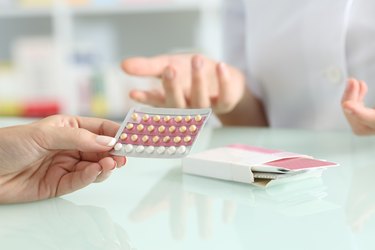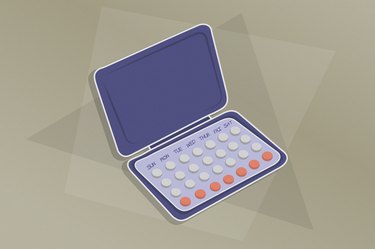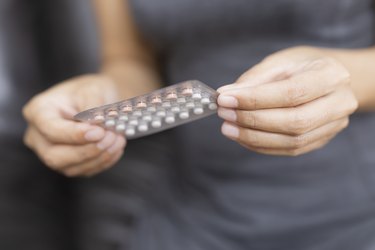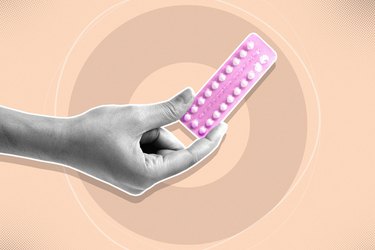
Maybe you're ready to start a family. Perhaps you broke up with your partner and don't plan to get busy any time soon. Or maybe you don't love the side effects of being on hormonal contraception. Whatever the reason, you stopped taking the pill.
But now the days are ticking by, and you still haven't gotten your period. What's going on? And should you be worried? Here, we shed some light on what might be happening.
Video of the Day
Video of the Day
What Is Post-Pill Amenorrhea?
Post-pill amenorrhea is when you don't get your period within three months of ditching the birth control pill (BCP).
To be clear: Taking the pill — or using any form of contraception, for that matter — does not affect your future fertility.
As a July 2018 study in Contraception and Reproductive Medicine concluded, "Contraceptive use, regardless of its duration and type, does not have a negative effect on the ability of [people assigned female at birth (AFAB)] to conceive following termination of use and it doesn't significantly delay fertility."
To understand why Aunt Flo hasn't visited yet when you part ways with the BCP, let's start by looking at how the pill works to prevent pregnancy.
A Period vs. Withdrawal Bleeding
"The birth control pill is typically a combination of a synthetic estrogen and a synthetic progestin," says Mark P. Trolice, MD, director of The IVF Center and professor of obstetrics and gynecology at the University of Central Florida College of Medicine.
"These hormones work to suppress ovulation." The pill also thickens cervical mucus, which prevents sperm from reaching the egg, according to the U.S. Food and Drug Administration (FDA).
The pills traditionally come in packs of 28 and you take one a day. The first 21 pills contain hormones, and the last seven are placebo pills, also called sugar pills. The placebo pills don't have hormones — they're intended to help you remember to take your daily pill.
"Women typically experience a vaginal bleed from hormonal withdrawal during the seven placebo pills," Dr. Trolice says. This is called "withdrawal bleeding," and you're not actually getting a real menstrual period.
Here's the difference: When you're not on birth control (and assuming you don't have a bun in the oven), your uterus sheds its lining — comprised of blood, tissue and nutrients — once every 28 days or so, resulting in a period.
"The ovaries produce a rhythmic fluctuation of hormones to facilitate ovulation and monthly menstrual bleeding," Dr. Trolice says. "The BCP, on the other hand, can allow for vaginal bleeding by hormonally stimulating the uterine lining and bypassing the ovaries." In other words, your body's not doing the work; the pill is.
Plus, not all pill users experience monthly withdrawal bleeding. The BCP can be prescribed for continuous daily use, avoiding placebo pills altogether. "As a result, reduced or no vaginal bleeding occurs in 68 to 88 percent of people," Dr. Trolice says.
The Pill Can’t Cause Infertility, But It Can Mask It
Let's say you have an underlying health condition preventing you from ovulating, and potentially making it difficult or impossible to get pregnant.
One of the most common red flags associated with these conditions is irregular periods or secondary amenorrhea (the lack of periods once you have experienced normal periods in the past).
If you're on the birth control pill, you might have no idea that something's amiss. After all, you're probably still having monthly withdrawal bleeding and everything appears A-OK. It's not until you get off the pill that you realize your cycle is out of whack.
How Is Post-Pill Amenorrhea Diagnosed?
Your doctor will likely talk to you about your medical history and give you a physical exam. They may do tests, including an ultrasound and/or blood tests. Here are some of the common culprits of post-pill amenorrhea, and the fertility outlook for each.
Breastfeeding
If you discontinue the pill while still nursing your baby, you might not get your period. "Breastfeeding around the clock will result in secondary amenorrhea," Dr. Trolice says. "This can last for the first six months post-partum."
Called lactational amenorrhea, it's caused by prolactin, a hormone your body churns out when breastfeeding. "Prolactin is a hormone secreted by the pituitary gland," says ob-gyn Lindsay Kroener, MD, assistant clinical professor of reproductive endocrinology and infertility at the University of California Los Angeles.
"Its function is to prepare the breast for milk production, and it increases during lactation or breastfeeding." Prolactin can suppress the hormones that cause ovulation and menstruation.
You're more likely to stop getting your period if you are fully breastfeeding, including at night, according to La Leche League International. Your period typically returns when your baby is between nine and 18 months. If your period doesn't return after you've weaned your little one, call your doctor.
Polycystic Ovary Syndrome (PCOS)
Aside from being prego, polycystic ovary syndrome (PCOS) is the number one reason for skipped periods — and it's the top cause of infertility.
"Affecting 6 to 12 percent of [people AFAB], it's the most common hormonal disorder during the reproductive years," says Dr. Trolice. "The diagnosis is based on having two of the following three criteria: ovulation dysfunction; elevated male hormones; and/or multicystic ovaries."
Typical symptoms include irregular periods or lack of a period, acne and male-patterned hair growth — such as hair growing on your chin or chest, and/or thinning hair or baldness on your scalp.
According to the U.S. Department of Health and Human Services (HSS), PCOS can affect your fertility by setting into motion hormonal changes that prevent the development and release of eggs from the ovaries, aka ovulation. If you aren't ovulating, you can't conceive. It's also linked to other health issues, including diabetes, high blood pressure and high cholesterol.
Although there's no cure, there are steps you can take to improve the symptoms. "Medications such as oral contraceptives can help [balance] levels of hormones," says Jessica Shepherd, MD, ob-gyn and director of minimally invasive gynecology at the University of Illinois at Chicago and founder of Her Viewpoint.
"Weight loss is an important feature of management and treatment, as it helps many of the related health concerns, such as lowering lipid levels and blood pressure."
Dropping pounds can also improve your chances of getting pregnant. If that doesn't do the trick, your doctor might suggest medication to kickstart ovulation. A November 2015 study in Clinics found that this results in birth for 70 percent of people with PCOS. In vitro fertilization (IVF) is another option.
Female Athlete Triad
If you exercise too much, take note: "Female athlete triad is a potentially life-threatening disorder caused by decreased caloric intake with energy deficit from excess exercise or decreased nutrition, often due to eating disorders," Dr. Trolice says. "It's associated with bone mineral density loss and lack of menstrual periods."
According to a July 2015 review in the Journal of the American Academy of Orthopaedic Surgeons, female athlete triad can cause dehydration, muscle weakness, erratic heartbeat and kidney damage. Amenorrhea can lower your levels of bone-protective estrogen, leading to premature osteoporosis and putting you at greater risk of fractures.
It also affects fertility: Because people with female athlete triad don't ovulate, they are also unable to conceive, per an October 2021 study from the Journal of South Dakota State Medical Association.
"Aside from missed periods, signs of the female athlete triad include low body weight and refusal to maintain a healthy weight," Dr. Trolice says. "People with this condition have a fear of being overweight despite their extremely low BMI [body mass index] and have a disturbed body image or denial of the severity of being underweight." They may also be prone to stress fractures from exercise.
A team of professionals — often including a doctor, trainer, dietitian and counselor — can help people with female athlete triad reach a healthy BMI.
"For bone health, appropriate nutrition and a decrease in strenuous activity are recommended," Dr. Trolice says. "An adequate intake of calcium and vitamin D is also recommended, and the use of the birth control pill may limit bone loss."
If you do resume the pill, take note of this insight from Penn Medicine: "Oral contraceptives initiate menstrual bleeding even if underlying nutrition and hormones are still too low to support menstruation naturally. This makes it nearly impossible to know if someone is recovering or still suffering from the triad because they mask the underlying causes of infrequent menstrual cycles."
Premature Ovarian Insufficiency
Premature ovarian insufficiency (POI) is when your ovaries stop working before age 40, causing you to have irregular periods or no periods at all. Typically, the ovaries contain small sacs called follicles, where eggs form. According to the National Institute of Health (NIH), these follicles don't function properly in people with POI.
The other symptoms of POI resemble menopause: hot flashes, night sweats, low libido, moodiness and vaginal dryness. It can be difficult to get pregnant if you have POI.
There's no cure, but there are things you can do to abate the symptoms. "Many times, hormonal replacement therapy [containing synthetic estrogen and progestin] is used, but this will not help with fertility," says Dr. Shepherd.
If you're hoping to start a family, a March 2019 study in Biomedicines suggests that IVF might be successful for some folks with POI, depending on the number and quality of your eggs. For others, egg donation or surrogacy may be the best option. "Also of note: Up to 50 percent of people with POI can have an occasional period and 5 to 10 percent may still conceive," Dr. Trolice says.
Asherman’s Syndrome
Also called intrauterine adhesions, Asherman's Syndrome occurs when you have severe scar tissue inside the cavity of the uterus. According to Penn Medicine, the most common cause of intrauterine adhesions is uterine surgery — typically, from having several dilation and curettage (D&C) procedures.
"It can impact fertility by resulting in inflammation inside the uterus, as well as preventing fertilized eggs from settling on the endometrium [lining of the uterus]," Dr. Shepherd says.
Symptoms include periods that are MIA or infrequent, pain and cramping with your cycle, difficulty conceiving and miscarriages.
"Intrauterine adhesions can be surgically removed with a hysteroscopy," Dr. Shepherd says. This is a small tool inserted into your vagina to remove scar tissue. You will often be given estrogen treatment to help with healing from the procedure.
If the surgery is successful, you may be able to get pregnant. A small December 2015 study in the Journal of Reproduction & Infertility found that within two years after a hysteroscopy, 53 percent of people with mild Asherman's, 30 percent of those with a moderate case and 10 percent of those with severe intrauterine adhesions became pregnant.
Elevated Prolactin
If you're breastfeeding, having higher than usual levels of prolactin (and not getting a period as a result) is par for the course. But sometimes people experience a surge in prolactin even when they don't have a milk vampire.
"Elevated prolactin, or hyperprolactinemia, has many causes, including pituitary tumors, certain medications, abnormalities in thyroid function, stress and kidney dysfunction," Dr. Kroener says.
And it can take a toll on your baby-making ability. "Prolactin suppresses the pituitary gland from secreting the hormones that allow for ovulation, as well as the secretion of estrogen and progesterone of the ovary," Dr. Kroener says. "Fertility can be significantly impaired when ovulation and production of estrogen and progesterone do not occur in a normal, monthly fashion."
For people AFAB, the top symptom of hyperprolactinemia is irregular or absent periods. "One of the other most common symptoms is galactorrhea, or milky nipple discharge that is not related to breastfeeding," Dr. Kroener says. "When hyperprolactinemia is caused by a pituitary tumor, people more rarely present with headaches and/or abnormalities in vision. Decreased libido and low bone mineral density, related to low estrogen levels, may also be present."
Treatment depends on what's causing your excess prolactin. If it's a side effect of medication (psychiatric and hypertensive meds are common culprits), your doctor might switch your pill regimen.
For those with thyroid abnormalities, your doctor will focus on improving your thyroid condition. Pituitary tumors are often resolved with medication (in rare cases surgery and radiation therapy may be recommended).
I Haven’t Gotten a Post-Pill Period Yet. Should I Be Worried?
It depends on how long it has been. Once you break up with your BCP, it can take time for your body to start producing natural estrogen and progesterone — the hormones responsible for regulating your cycle, including ovulation and menstruation.
Many people get their period within 30 days, but it could take up to three months before you're riding the crimson wave again.
If you reach the three-month mark without a shark week, take a pregnancy test. "This is the most common cause of post-pill amenorrhea during the reproductive years," Dr. Trolice says. Then, see your primary care physician or ob-gyn for an evaluation.
- Contraception and Reproductive Medicine : "Return of fertility after discontinuation of contraception: a systematic review and meta-analysis"
- FDA: "Birth Control"
- La Leche League International: "Menstruation"
- HSS: Polycystic Ovary Syndrome"
- Journal of the American Academy of Orthopaedic Surgeons: "Female Athlete Triad Past, Present, and Future"
- South Dakota State Medical Association: "The Female Athlete Triad - What it is and Why it is Important in Primary Care"
- Penn Medicine: "Hormonal Changes Affect Female Athletic Performance. Period."
- NIH: "Primary Ovarian Insufficiency"
- Biomedicines: "Premature Ovarian Insufficiency: Procreative Management and Preventive Strategies"
- Journal of Reproduction and Infertility: "Reproductive Outcome of Patients with Asherman’s Syndrome: A SAIMS Experience"
Is this an emergency? If you are experiencing serious medical symptoms, please see the National Library of Medicine’s list of signs you need emergency medical attention or call 911.



